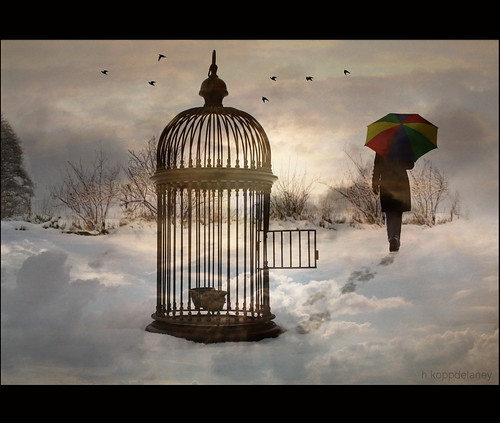
"Then said Jesus to those Jews which believed on him, If ye continue in my word, then are ye my disciples indeed; and you will know the truth, and the truth will set you free.”
- John 8:31-32
"Harmony and understandingHosni Mubarak's brutal repression of protesters proved to virtually everyone except Vice President Joe Biden that he was a dictator. And like many dictators before him (Shah Mohammad Reza Pahlavi, Idi Amin, Bébé Doc, Ferdinand Marcos, Nicolae Ceaușescu, Augusto Pinochet and Mobutu Sese Seko, just to name a few), his own people forced his exit from power. But there is something extraordinary about the overthrow of Mubarak: he was forced out with very little real or threatened violence. In contrast to their government, the Egyptian protesters were astonishingly peaceful.
Sympathy and trust abounding
No more falsehoods or derisions
Golden living dreams of visions
Mystic crystals revelations
And the mind's true liberation
Aquarius...
Aquarius!”
- From "Age of Aquarius" by James Rado, Gerome Ragni and Galt Macdermot
How did the protesters prevail without engaging in thuggery? The answer may be found in the 1973 book "The Machinery of Freedom" by David Friedman (son of economist and Nobel prize winner Milton Friedman). In this book, David Friedman makes the case for a much smaller government, replacing most forms of state coercion with voluntary arrangements. I learned a lot from this book, even though I do not subscribe to Friedman's rather extreme form of libertarianism. "The Machinery of Freedom" forces the reader to reflect on the assumptions we often make about the need for government power. No wonder that this book made Australia's Institute of Public Affairs list of 20 books that you must read before you die.
Two chapters of this book are quite apropos to the current middle east revolts. In "Revolution is the Hell of It", Friedman rejects violent revolution as a tactic to produce a libertarian state. Violence is counterproductive violation of libertarian principles. The final chapter, "How to Get There From Here", proposes a peaceful alternative to revolution: undermining the state's legitimacy. Even in the worst dictatorships, government power derives mostly from the majority of the population believing in the legitimacy of their leadership. They may dislike their leaders, but they think that only the current leaders can run their country, and that without these leaders, their nation would descend into chaos. As the Milgram experiments demonstrated, the pressure of group conformity can reinforce such a viewpoint. Friedman felt that an overbearing state could be reigned in through a combination of education and demonstration, convincing citizens that they can run their country without sacrificing their freedoms. As Lennon and McCartney wrote in the song "Revolution", "You better free your mind instead".
Is this recipe for peaceful overthrow of a tyrannical state too optimistic? I certainly thought so when first read this book. But consider what happened in Egypt. In a very short period, Mubarak's legitimacy vaporized. Shahira Amin, one of Nile TV' most popular journalists, abruptly quit because her network would only present government propaganda, a violation of her journalistic principles. In the days before Mubarak stepped down, there were a sizable number of policemen that refused to take action against the protesters. So somehow, the Egyptians pulled off Friedman's Utopian vision of how to end government repression.
I doubt that this kind of revolt could have happened in 1973. What made it possible today is a technical breakthrough: social networking. Earlier this year, an Egyptian blogger posted a video of police rape and torture of dissidents. And as Mubarak supporters learned, once a video hits the internet, it never disappears. This video, along with unrest in Tunisia, became popular Facebook topics. Opponents of Mubarak saw that they were not alone in their concerns. Facebook also turned out to be an excellent organizing tool. Recognizing the threat, the government tried cutting off internet access (is that the reason why there is talk in Washington about an internet kill switch?), but the dissidents found ways around this, including going back to dial-up access to foreign internet providers. So remember folks, don't throw away those 56K modems!
 From the start of the Mubarak regime until shortly before his downfall, the various U.S. administrations have been solidly behind him. For that reason, it is hard to find an Egyptian protester with a positive word for an American Politician. There is an American, however, who is spoken of quite highly by these protesters: Mark Zuckerberg, founder of Facebook. If anybody gets a Nobel Peace Prize for the handling of the Egyptian crisis, it should be Zuckerberg, but unfortunately it will probably go to some politician instead. But history will remember that Facebook was a very important part in the Egyptian machinery of freedom.
From the start of the Mubarak regime until shortly before his downfall, the various U.S. administrations have been solidly behind him. For that reason, it is hard to find an Egyptian protester with a positive word for an American Politician. There is an American, however, who is spoken of quite highly by these protesters: Mark Zuckerberg, founder of Facebook. If anybody gets a Nobel Peace Prize for the handling of the Egyptian crisis, it should be Zuckerberg, but unfortunately it will probably go to some politician instead. But history will remember that Facebook was a very important part in the Egyptian machinery of freedom.


I'm not sure this is accurate but I was told that the US military has been training Egyptian military in non-violent techniques in dealing with crowds. This may have resulted from the 1973 book of which you speak and been worked up into training courses.
ReplyDeleteI'm not sure about a Nobel Prize but I know that you raise a very important unanswerable question about whether Egypt would still have Mubarak if there was no Facebook. Do not overlook Internet access, Twitter, and news available instantly throughout the world.
ReplyDelete